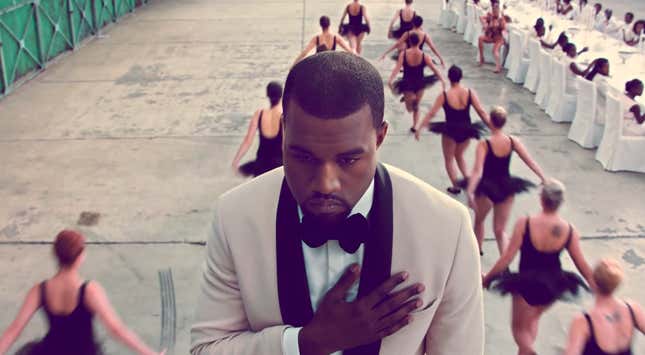
A funny thing about My Beautiful Dark Twisted Fantasy when compared to the other rap albums that exist in the space where “iconic album” and “album I happen to love” overlap is that I don’t remember where or when I first heard it. I could tell you where I was when I first heard Wu-Forever (in high school, on a stereo in my man Lenny’s living room), Supreme Clientele (on campus at Canisius, in a car in the Bosch Hall parking lot), The Blueprint (still on campus, but in my apartment), and even The College Dropout (in my man Heath’s car, sitting outside of Wilkinsburg Junior/Senior High School). But not for this.
I think the reason why MBDTF didn’t earn that status, despite being perhaps my favorite rap album ever (Supreme Clientele is the only other contender) is the rollout. It existed as this culminating entity that concluded G.O.O.D. Fridays; by the time the album officially dropped, I’d already heard half of it. At least I thought I had. So I didn’t anticipate it as much as I just regarded it as a physical curation of a series of songs I’d already heard (and loved) enough to memorize. The only mystery, I thought, was sequencing and inclusion. (“Christian Dior Denim Flow” not making the cut still makes me want to stab someone.)
But then I listened to the album, and Kanye revealed that what we’d heard in the preceding months were rough drafts. The somewhat underwhelming and unfinished-sounding “Ghetto University” was actually “All Of The Lights”—only now it was six minutes long and featured literally everyone who’s ever made music before. “Devil in a New Dress”—which I already loved—came armed with Rick Ross’ best verse. “Hell of a Life” had different lyrics, a different chorus, and a motherfucking xylophone.
The vulnerability required to show your work like this, to edit things in front of an audience in real time, is what initially endeared me to Kanye—that and also the fact that his music was impervious to prediction. With most other prolific rap artists—Jay-Z, Nas, Lil’ Wayne, Drake, etc.—you come to their new albums equipped with a preconceived and mostly accurate idea of how it’s going to sound. The only question that remains is level of quality. But Kanye, like Ghostface before him and Kendrick Lamar today, consistently subverted this. Rap albums in 2008 just did not sound like 808s & Heartbreaks (which I initially hated) or MBDTF in 2010.
Kanye’s frequently lauded musicianship and ear accounts for some of this volatility. But his albums have also always existed within a fog of transparently self-conscious critical-hypercognizance. Work engineered to be praised as much as it’s bought and felt. Shit that’s capital letter Important. My Beautiful Dark Twisted Fantasy was supposed to be his Thriller—the sort of album that didn’t just shift the zeitgeist, but became it. It didn’t, though, and he never quite recovered from that disappointment.
It feels odd to call an album as critically and commercially successful as MBDTF was a disappointment. And, to be clear, it wasn’t that to me. It contained everything I desired in an album (star-making features, random crack verses, sprinkles of the Wu, etc.) and even shit I didn’t know I wanted until I heard it (rap songs with no actual rapping in them, Fergie, whatever the fuck it is he did on the last three minutes of “Runaway”, etc.). But Kanye’s oft-stated desire to make a Thriller-type album was apparent in both the rollout and the construction of it. You don’t call in whichever favors you need to get Elton John and Rihanna and Drake on the same damn album—and on the same damn song—unless you want it to be the album. And you definitely don’t create and release (for free) a whole ass fucking movie unless you intend for said movie to be an essential accompaniment to an iconic, time-stopping work.
And yeah, it won some Grammys. But not the big ones. And it went double platinum. But that’s not diamond. It captured neither the critical nor the commercial success he wished for.
I have more thoughts on the danger of chasing a (white) validation loop that I will not expound on today. But it’s no coincidence that after his transparent aim to reach a status that remained elusive, his work became angrier. “Yeezus” (an album I love) is a painfully sparse and vulgar 10-track-long middle finger. And then also the unfinished rough drafts that used to be singles and mixtape fodder became his sloppily completed albums. One of the byproducts of this downshift was that the flippant misogyny that had always been ensconced in his music became more conspicuous—a zit with a face on it instead of a face with a zit on it.
Today, Kanye West is, well, who Kanye West is. There are few cultural figures who’ve had steeper dips in esteem. (And none I can think of whose Black people approval rating plummeted from “generally beloved” to “universally loathed” in such a quick period of time without committing any crimes.) But 10 years ago, things were different. Kanye dropped the best rap album of the century. Too bad that wasn’t enough for him.